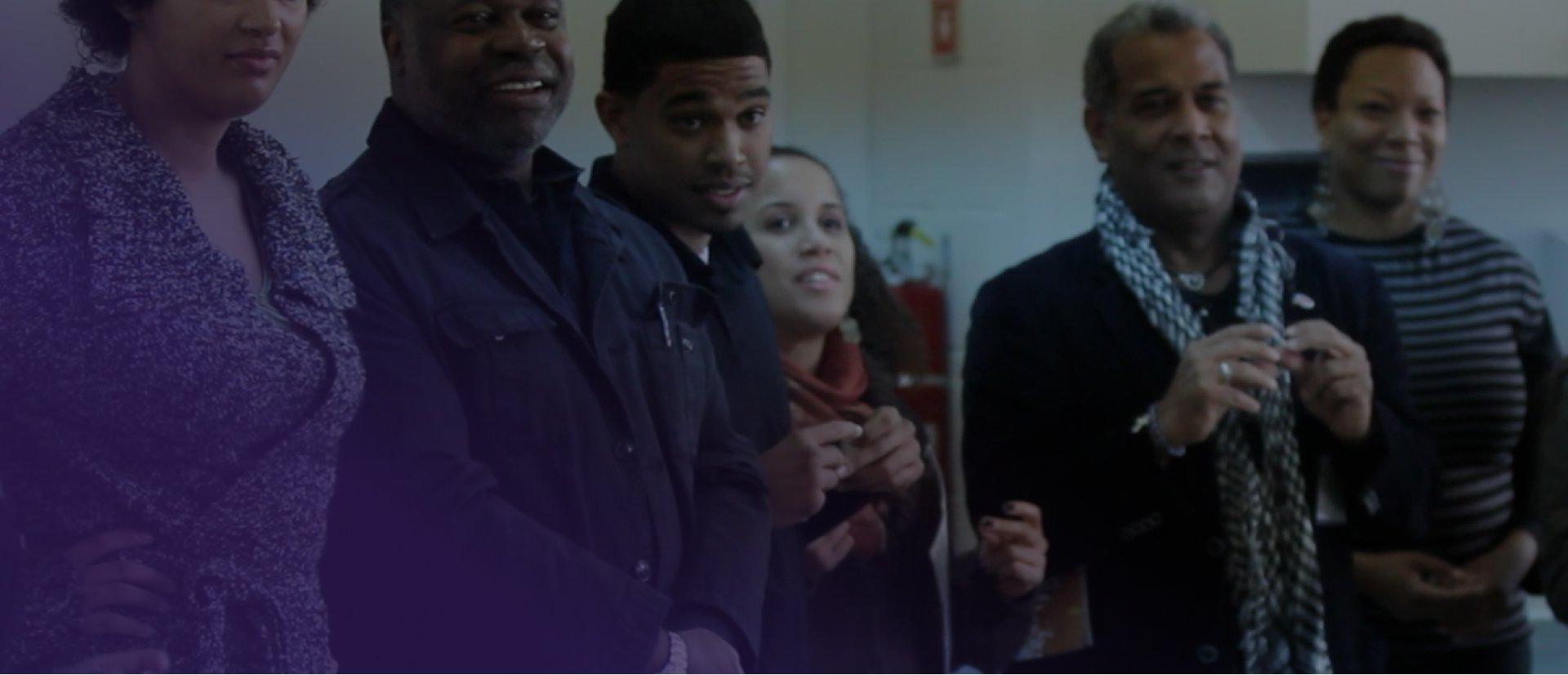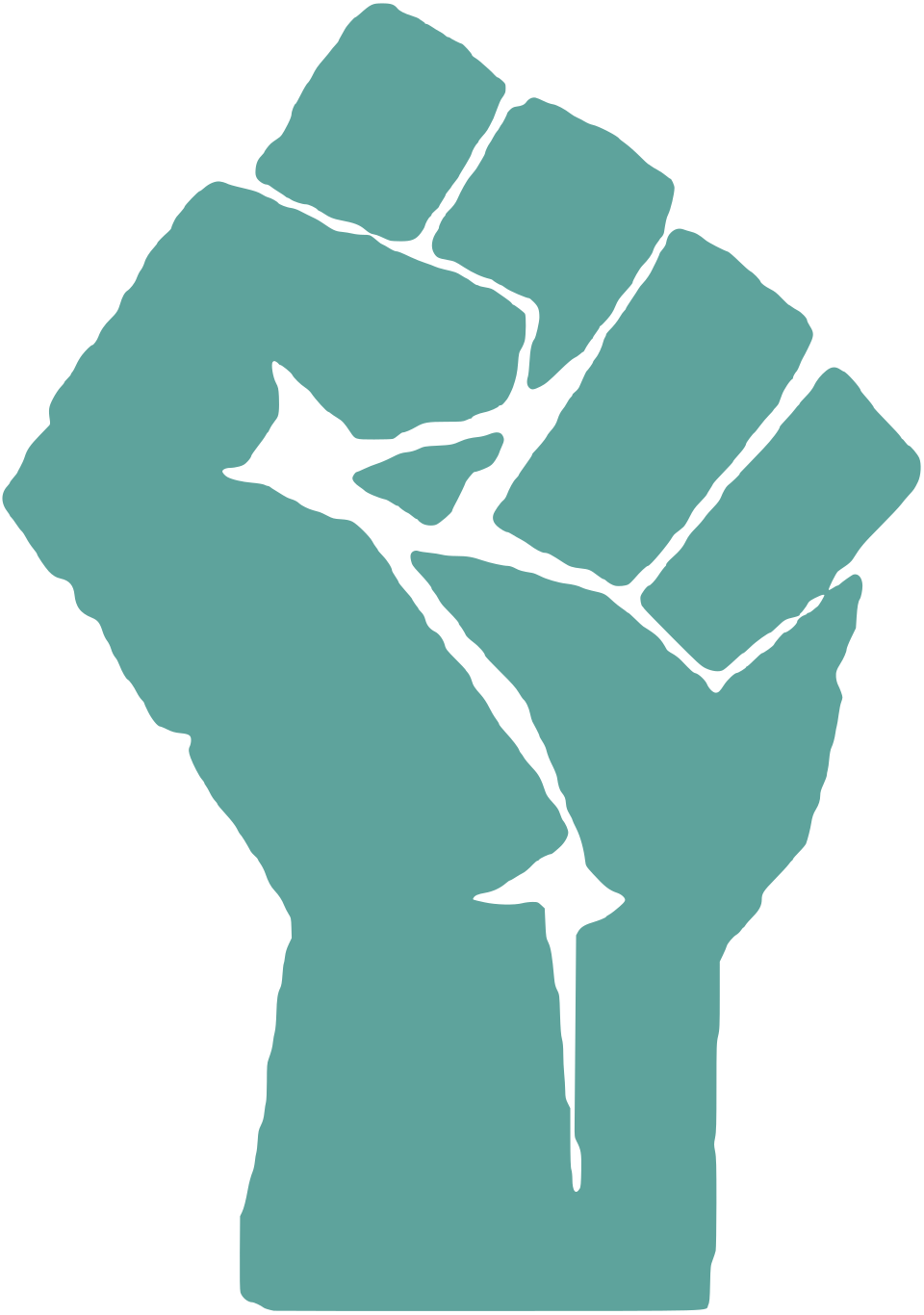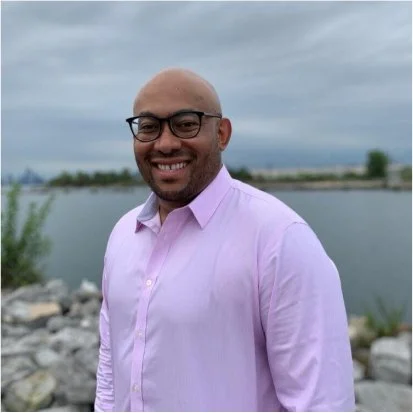
Demanding recognition and visibility of AfroLatin@s.
Mission
The afrolatin@ forum is a research and resource center that centers Blackness within Latinidad. We focus on Latin@s of African descent in the United States to provide a bridge that expands our understanding of the African Diaspora. We support the struggle for racial and social justice through dialogue and action by engaging communities, forging coalitions, creating accessible educational materials, and organizing public events.
We have an anti-racist, anti-patriarchal, and anti-capitalist lens, and seek to affirm all aspects of AfroLatinidad. Our work is guided by a communal perspective that recognizes the centrality of race in today’s global reality.
Vision
The afrolatin@ forum envisions a world where Black Latinidad is affirmed and the contributions of the African Diaspora are embraced as central within Latinidad and essential in the world. We work to ensure that AfroLatinxs improve their quality of life by repairing the impact of white supremacy.
The afrolatin@ forum’s work is guided by the following core values:
Community
We value the strength, endurance, cultures, experiences, and knowledge of Latin@s of African descent in the United States and globally. We continue to add to the knowledge of the entirety of the African diaspora.
Black Liberation
Black liberation is at the core of our work. We believe it means creating a world where Black people can live peacefully, free from the constant threat of social, economic, and political oppression. For us, Black liberation is tied to the broader goal of human liberation and social transformation. As the Combahee River Collective Statement says, "If Black women were free, it would mean that everyone else would have to be free since our freedom would necessitate the destruction of all the systems of oppression."
Racial Justice
We value and promote all efforts directed at bringing about social and economic equity. We emphasize a transnational perspective on the role of race in society, historically and in the present.
Affirmation and Celebration
We value our history, acknowledge our contributions, and celebrate the African foundations of our diverse cultural expressions. We also affirm and celebrate all expressions of AfroLatinidad especially focusing on celebrating Femininity and Queerness.
Pan-Africanism
We embrace Pan-Africanism as a political ideology, movement, and cultural philosophy focused on uniting all people of African descent. Its goal is to achieve economic, social, and political self-determination and freedom from oppression. We believe Pan-Africanism emphasizes a shared identity and history, aiming to build an AfroFuture that confronts racial injustice through unity and collective action.
Transparency
We value an ethical, open, and collaborative approach in our work. We are committed to a communal vision.
Dialogue
We value the respectful exchange of perspectives across and within ethnic communities and national borders.
Creativity
We celebrate the creativity of the Diaspora and affirm all of its expressions.
Our Team
-
Zaire Dinzey-Flores is Associate Professor in Sociology and Latino & Hispanic Caribbean Studies at Rutgers University. Her research focuses on understanding how urban space mediates community life and social inequality. Her book, Locked In, Locked Out: Gated Communities in a Puerto Rican City, winner of the 2014 Robert E. Park Award for best book in urban and community sociology, investigates race and class inequality as negotiated through community gates in private and public housing. Her new project examines race and class as enacted in the production of housing built environments in a gentrifying neighborhood.
-
Guesnerth Josué Perea is Executive Director of the afrolatin@ forum, Co-Curator of the AfoLatine Theology Project, Executive Producer of the documentary "Faith in Blackness: An Exploration of AfroLatine Spirituality", and Co-Host of the podcast "Majestad Prieta". His writings on AfroLatinidad have been part of various publications including Let Spirit Speak! Cultural Journeys through the African Diaspora, the Revista de Estudios Colombianos, and most recently Engaging Religion, a digital journal by Indiana University. Josué was once named by the newspaper amNewYork as one of five Colombians "making a mark" in New York City.
-
Melissa M. Valle is an assistant professor, jointly appointed in the Department of Sociology and Anthropology and the Department of African American and African Studies at Rutgers University-Newark. She is also a core faculty member of the Global Urban Studies/Urban Systems Ph.D. program. Dr. Valle is cultivating a body of research that unpacks the notion of “racial worth” by revealing how symbolic meanings become embedded within distributive frameworks and subsequently contribute to inequality in the Americas. Dr. Valle’s current book project, Battling for Worth: Race, Recognition, and Urban Change on Colombia’s Caribbean Coast (under contract with Oxford University Press) explores the criteria people use to determine what and who has worth, at different spatial scales, in the context of urban spatial and economic change in Cartagena de Indias, Colombia. Prior to completing her PhD, she spent ten years working with youth in various capacities, most recently as a New York City Teaching Fellow on the Lower East Side. She also worked as a community development public policy director in Harlem. Dr. Valle is a recipient of a Fulbright student award to Colombia and has dual bachelor’s degrees in economics and Afro-American Studies from Howard University, a Master of Public Administration in public and nonprofit management and policy from New York University, a Master of Science for Teachers in childhood education from Pace University, and a Master of Arts, Master of Philosophy, and Ph.D. in sociology from Columbia University.
-
Dr. Pablo José López Oro is an Assistant Professor in the Department of Africana Studies at Smith College. His research and teaching interests are on Black Latin American and U.S. Black Latinx social movements, Black Feminist & LGBTQ activism and political mobilizations, and Black Queer Feminist ethnographies in the Américas. His current manuscript, Indigenous Blackness in the Americas: The Queer Politics of Self-Making Garifuna New York is a transdisciplinary ethnography on how gender and sexuality shapes the ways in which transgenerational Garifuna New Yorkers of Central American descent negotiate, perform, and articulate their multiple subjectivities as Black, Indigenous, and AfroLatinx. He has been with the afrolatin@ forum since August 2009.
-
Yamila Sterling-Baker is a Program Manager for the Food System Support-a program in Solid Ground. She manages the coordination of the emergency food system in Seattle, Washington. Ms. Sterling formerly was a Project Manager for Xerox Corporation; publication Director for the Center for Puerto Rican Studies; Assistant Program Director for the Melrose II “I Have a Dream” Program in the South Bronx, where shed focused on youth identity empowerment. She has a BA in Sociology and Africana and Puerto Rican/Latino Studies from Hunter College. She joined the Afrolatin@ Forum in 2007.
-
Tanya Katerí Hernández is the Archibald R. Murray Professor of Law at Fordham University School of Law. She received her A.B. from Brown University, and her J.D. from Yale Law School. Professor Hernández is an internationally recognized comparative race law expert and Fulbright Scholar whose work in that area has been published in numerous outlets. Her most recent book from Beacon Press is Racial Innocence: Unmasking Latino Anti-Black Bias and The Struggle for Equality. She has previously served as a Law and Public Policy Affairs Fellow at Princeton University, a Faculty Fellow at the Institute for Research on Women at Rutgers University; a Faculty Fellow at the Fred T. Korematsu Center for Law and Equality, and as a Scholar in Residence at the Schomburg Center for Research in Black Culture. Professor Hernández is a Fellow of the American Bar Foundation, the American Law Institute, and the Academia Puertorriqueña de Jurisprudencia y Legislación. Hispanic Business Magazine selected her as one of its annual 100 Most Influential Hispanics.
-
Yosef Medina serves as the director of Community Initiatives at Virginia Humanities, the state’s humanities council headquartered at the University of Virginia in Charlottesville, Va. In his role, Mr. Medina provides leadership and expertise in broadening and strengthening community partnerships statewide. Mr. Medina leads the Virginia HBCU Scholars fellowship, the Virginia African American Cultural Resources Task Force, and works across the organization to co-design and develop educational content. Prior to his current role, Mr. Medina worked with youth and families in the K-12 public school system as well as the juvenile justice system as an education and re-entry program specialist in Harlem, N.Y. In addition to his work at Virginia Humanities, Mr. Medina serves on the board of directors for Canary Academy Online, the AfroLatino Forum, as chair of the Education and Career Training committee for the Virginia Latino Advisory Board, and is also a visiting scholar at the Center for Minority Serving Institutions in the Graduate School of Education at Rutgers University.
-
Isabela Arboleda-Ocoro (IAO) is an Afro-India Colombiana from Houston, Texas who recently graduated with a BFA with honors from New York University. With her double major in Studio Art and Social and Cultural Analysis she has explored the afro-diaspora throughout the Americas and how it interacts with blackness and indigeneity. Within her practice she illustrates this research through personal archives, delving into her relationships and the experiences of existing in a femme body in the wake of a ‘post-colonial’ world.
-
Obrian Rosario is a first-year student at Howard University's School of Law, currently enrolled in the Inaugural Cohort of the B.A/J.D. Joint Degree Program. He will graduate from Howard University with a B.A. in Political Science with a Minor in Spanish this coming May. Prior to embarking on his legal studies, Obrian served as the Co-Founding Youth Executive Director of the Peer Defense Project, where he spearheaded a pioneering youth-centered intergenerational movement lawyering initiative focused on addressing critical public school education issues. Additionally, he held the position of President at Changó, Howard University's Afro-Latine and Spanish Speaking Society. Overcoming challenges presented by the pandemic, Obrian revitalized the organization, transforming it into the foremost representative of Afro-Latiné culture on campus. Under his leadership, membership skyrocketed from 0 to over 50 within a year. Through his dynamic leadership, Obrian orchestrated a series of successful dance activities, social events, a sold-out Afro-Latine cultural showcase, community service projects, and the groundbreaking launch of Radio Changó—the premier Spanish-language and Latin America-focused podcast at any HBCU. Obrian is driven by a commitment to leveraging his experiences and skills to address pressing global challenges, particularly those faced by African descendants worldwide, in his future career as an attorney.
FAQ’s
-
Identification as an “AfroLatin@” acknowledges the racial diversity among Latin Americans, Caribbeans and Latin@s and the historical, political, and social particularities that characterize the experiences of people of African descent throughout the Americas. By self-consciously identifying as AfroLatin@ we assert our cultural/ethnic origins AND our membership in the African diasporic community.
“Black” and “Latin@” are not mutually exclusive identities - AfroLatin@s belong to both groups.
-
We use the @ sign in order to indicate gender inclusion. This practice originates with the Latin American feminist movement of the 1970s (long before e-mail!) and is used as a corrective to the gender-specific character of the Spanish language. “AfroLatin@” is the equivalent to “AfroLatino and AfroLatina” or “AfroLatina/o.”
Efforts challenging the gender binary in Spanish have included the use of the at sign (Latin@)—the symbol suggesting inclusivity by having an "o" encircling an "a."
Some people don’t necessarily like this notation because, in their mind, the @ still alludes to the masculine and feminine duality that exists in Spanish, thereby constraining the writer to dichotomous conceptions of Spanish.
One could argue that the @ pays respect to indigenous and ancient roots that assert the duality of gender in all creation.
We firmly and wholeheartedly believe in the inclusion of all LGBTQIA+ people in any conversation about justice.
-
The AfroLatin@ Forum is a great resource for discovering information regarding the history of afrolatinos. We are in the process of providing online resources for members including a bibliography and archival materials. However, you can visit our resources page for books, articles, links and other resources you can use to get more information about AfroLatin@s. However, a good place to start is The Afro-Latin@ Reader: History and Culture in the United States, edited by Miriam Jiménez Román and Juan Flores
-
Hispanic usually refers to Spanish-speaking countries in the Americas and denotes a relationship to Spain. Latin@ refers to Latin-based romance languages of Spain, France, Italy and Portugal and geographically regional Latin American countries, which include Haiti and Brazil. The term 'Latin America' was pioneered by Napoleon as a way to declare French influence in the Americas. The 2010 U.S census classification: “Hispanic or Latino” refers to a person of Cuban, Mexican, Puerto Rican, South or Central American, or other Spanish culture or origin regardless of race.













